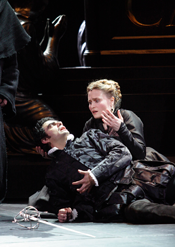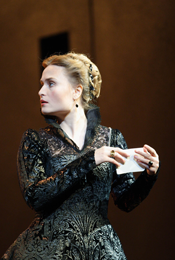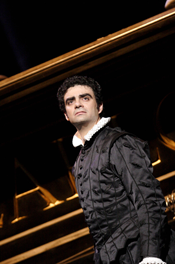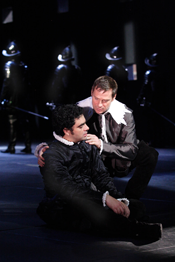
23 Jun 2008
Don Carlo at Royal Opera House
In the latter part of last year, the casting for Nicholas Hytner’s new production of Don Carlo — in the five-act Italian version — looked to be on shaky ground.
English Touring Opera are delighted to announce a season of lyric monodramas to tour nationally from October to December. The season features music for solo singer and piano by Argento, Britten, Tippett and Shostakovich with a bold and inventive approach to making opera during social distancing.
This tenth of ten Live from London concerts was in fact a recorded live performance from California. It was no less enjoyable for that, and it was also uplifting to learn that this wasn’t in fact the ‘last’ LfL event that we will be able to enjoy, courtesy of VOCES8 and their fellow vocal ensembles (more below …).
Ever since Wigmore Hall announced their superb series of autumn concerts, all streamed live and available free of charge, I’d been looking forward to this song recital by Ian Bostridge and Imogen Cooper.
Although Stile Antico’s programme article for their Live from London recital introduced their selection from the many treasures of the English Renaissance in the context of the theological debates and upheavals of the Tudor and Elizabethan years, their performance was more evocative of private chamber music than of public liturgy.
Evidently, face masks don’t stifle appreciative “Bravo!”s. And, reducing audience numbers doesn’t lower the volume of such acclamations. For, the audience at Wigmore Hall gave soprano Elizabeth Llewellyn and pianist Simon Lepper a greatly deserved warm reception and hearty response following this lunchtime recital of late-Romantic song.
For this week’s Live from London vocal recital we moved from the home of VOCES8, St Anne and St Agnes in the City of London, to Kings Place, where The Sixteen - who have been associate artists at the venue for some time - presented a programme of music and words bound together by the theme of ‘reflection’.
'Such is your divine Disposation that both you excellently understand, and royally entertaine the Exercise of Musicke.’
‘And there was war in heaven: Michael and his angels fought against the dragon; and the dragon fought and his angels, And prevailed not; neither was their place found any more in heaven … that old serpent … Satan, which deceiveth the whole world: he was cast out into the earth, and his angels were cast out with him.’
There was never any doubt that the fifth of the twelve Met Stars Live in Concert broadcasts was going to be a palpably intense and vivid event, as well as a musically stunning and theatrically enervating experience.
‘Love’ was the theme for this Live from London performance by Apollo5. Given the complexity and diversity of that human emotion, and Apollo5’s reputation for versatility and diverse repertoire, ranging from Renaissance choral music to jazz, from contemporary classical works to popular song, it was no surprise that their programme spanned 500 years and several musical styles.
The Academy of St Martin in the Fields have titled their autumn series of eight concerts - which are taking place at 5pm and 7.30pm on two Saturdays each month at their home venue in Trafalgar Square, and being filmed for streaming the following Thursday - ‘re:connect’.
The London Symphony Orchestra opened their Autumn 2020 season with a homage to Oliver Knussen, who died at the age of 66 in July 2018. The programme traced a national musical lineage through the twentieth century, from Britten to Knussen, on to Mark-Anthony Turnage, and entwining the LSO and Rattle too.
With the Live from London digital vocal festival entering the second half of the series, the festival’s host, VOCES8, returned to their home at St Annes and St Agnes in the City of London to present a sequence of ‘Choral Dances’ - vocal music inspired by dance, embracing diverse genres from the Renaissance madrigal to swing jazz.
Just a few unison string wriggles from the opening of Mozart’s overture to Le nozze di Figaro are enough to make any opera-lover perch on the edge of their seat, in excited anticipation of the drama in music to come, so there could be no other curtain-raiser for this Gala Concert at the Royal Opera House, the latest instalment from ‘their House’ to ‘our houses’.
"Before the ending of the day, creator of all things, we pray that, with your accustomed mercy, you may watch over us."
The doors at The Metropolitan Opera will not open to live audiences until 2021 at the earliest, and the likelihood of normal operatic life resuming in cities around the world looks but a distant dream at present. But, while we may not be invited from our homes into the opera house for some time yet, with its free daily screenings of past productions and its pay-per-view Met Stars Live in Concert series, the Met continues to bring opera into our homes.
Music-making at this year’s Grange Festival Opera may have fallen silent in June and July, but the country house and extensive grounds of The Grange provided an ideal setting for a weekend of twelve specially conceived ‘promenade’ performances encompassing music and dance.
There’s a “slide of harmony” and “all the bones leave your body at that moment and you collapse to the floor, it’s so extraordinary.”
“Music for a while, shall all your cares beguile.”
The hum of bees rising from myriad scented blooms; gentle strains of birdsong; the cheerful chatter of picnickers beside a still lake; decorous thwacks of leather on willow; song and music floating through the warm evening air.

In the latter part of last year, the casting for Nicholas Hytner’s new production of Don Carlo — in the five-act Italian version — looked to be on shaky ground.
Almost as soon as the 2007/08 season’s details had been published, Angela Gheorghiu decided that the role of Elisabetta di Valois was not for her after all and left Covent Garden’s casting department the challenge of finding a suitable replacement. Soon afterwards Rolando Villazón, the star Mexican tenor destined for the role of Carlo, took a sabbatical on medical advice and cancelled a clutch of international engagements including his planned appearance as Nemorino in the Royal Opera’s L’elisir d’amore.
Anyhow, Villazón returned from his break, the company engaged its former Young Artist Marina Poplavskaya as Elisabetta, the production sold out as soon as it went on sale, and everything appeared to bode well.
 Marina Poplavskaya as Elisabetta
Marina Poplavskaya as Elisabetta
On the evidence of this opening night, Villazón is not yet back to full vocal health. When he is on form, he delivers some thrillingly ardent singing, but elsewhere he is frustratingly inconsistent with cracked notes and intonation problems. The Fontainebleau scene was shoddily sung to the extent that it was tempting to leave at the first interval. And Villazón’s nervy, angsty dramatic interpretation had a tendency to reduce the young prince’s struggles with forbidden love and conflicting political duties to the petty tantrums of a moody adolescent.
 Rolando Villazón as Don Carlo
Rolando Villazón as Don Carlo
Poplavskaya is potentially a great talent (as evidenced by her outstanding Rachel in last season’s concert performance of La Juive) but sadly the role of Elisabetta di Valois is really beyond her, at least for now. The absence of a full Italianate lirico-spinto tone is perhaps not the end of the world, but her obvious vocal fatigue towards the end of the performance presents a serious problem in a role whose major aria takes place in the final scene. The paleness of her pearly, ‘covered’ soprano is matched by an onstage persona that is far too much the ice maiden, even in the opening scene where we should surely be able to see the spark of youth and vitality that has so captivated the impetuously youthful Carlo.
My comments thus far have perhaps made the whole effort sound disastrous. Fortunately this was not the case. As Posa, Simon Keenlyside gave a world-class performance; human, honest and noble. Ferruccio Furlanetto’s brittle Filippo and Eric Halfvarson’s terrifying Grand Inquisitor each exuded such gravitas of presence that their confrontation was truly gripping. The bells and oppressive Catholic glitz of the auto-da-fé scene packed a real punch, with special praise due to the chorus, while conductor Antonio Pappano seems to have the measure of the piece.
 Roland Villazón (Don Carlo) and Simon Keenlyside (Rodrigo)
Roland Villazón (Don Carlo) and Simon Keenlyside (Rodrigo)
Sonia Ganassi’s Eboli was decently-sung in a superficial sort of way, with a big personality and lots of showy fireworks, but her voice and her portrayal seemed to lack an emotional centre. Like Villazón and Poplavskaya, her voice seems a size too small.
The production bears many of Hytner’s hallmarks: uncomplicated situations and character interactions in front of handsome sets in colours evoking the time and place of the setting. The intricate detail used in the individual flats and costumes of Bob Crowley’s designs never takes away from the sense of an elegant visual simplicity. The snow-covered forest of Fontainebleau has a particularly elegant beauty. It is a good-looking, solid staging, and eminently revivable; it seems churlish to complain that it plays things rather safe. Hytner got some boos from the stalls on opening night, which was quite baffling — there were none of the usual triggers which incite audiences to dislike a new production so vehemently.
Ruth Elleson © 2008